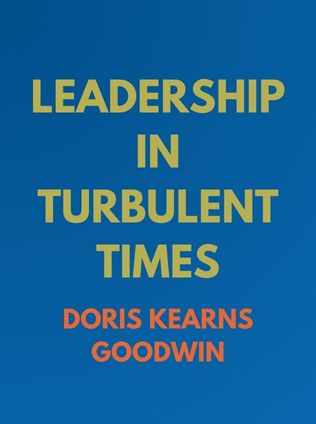
Leadership: In Turbulent Times
In Turbulent Times
By Doris Kearns Goodwin
Published 09/2018
About the Author
Doris Kearns Goodwin is a celebrated American historian and biographer, known for her in-depth explorations of U.S. presidents and their leadership during times of crisis. With a career that spans several decades, Goodwin has become one of the most respected voices in the field of presidential history, offering profound insights into the character, decisions, and challenges faced by some of the most influential leaders in American history. Her works, such as "No Ordinary Time," "Team of Rivals," and "The Bully Pulpit," are lauded for their narrative depth, meticulous research, and the way they humanize historical figures, making their stories relevant to contemporary readers.
In "Leadership in Turbulent Times," Goodwin turns her focus to four U.S. presidents—Abraham Lincoln, Theodore Roosevelt, Franklin Delano Roosevelt (FDR), and Lyndon B. Johnson—examining how their personal challenges shaped their leadership during national crises. By weaving together the personal and political, Goodwin offers a unique perspective on how adversity can forge the qualities of great leadership, providing valuable lessons for anyone interested in leadership, history, or both.
Main Idea
"Leadership in Turbulent Times" presents the compelling argument that great leaders are not simply born with the qualities that make them successful; rather, they are shaped by the personal crises they endure. Doris Kearns Goodwin meticulously examines how the struggles faced by Abraham Lincoln, Theodore Roosevelt, Franklin Delano Roosevelt, and Lyndon B. Johnson molded their leadership styles and enabled them to guide the United States through some of its most challenging periods. Through these case studies, Goodwin illustrates that the crucible of personal adversity often produces the resilience, empathy, and clarity of purpose necessary for effective leadership in times of national crisis.
Table of Contents
- Introduction: The Making of Great Leaders
- Abraham Lincoln: Intellectual Rigor and the Power of Persuasion
- Theodore Roosevelt: Courage and the Bias Toward Action
- Franklin Delano Roosevelt: Empathy as a Leadership Tool
- Lyndon B. Johnson: The Power of Purpose
- Conclusion: Lessons in Leadership
Introduction: The Making of Great Leaders
What makes a great leader? Is it an inherent quality, or is it something that can be developed over time? Doris Kearns Goodwin, in "Leadership in Turbulent Times," argues persuasively that the qualities that define great leaders are often forged in the fires of personal adversity. This book is not just a recounting of historical events but a deep dive into the personal lives of four U.S. presidents who, despite their flaws and struggles, rose to the occasion when their country needed them most.
Goodwin posits that these leaders—Abraham Lincoln, Theodore Roosevelt, Franklin Delano Roosevelt, and Lyndon B. Johnson—did not emerge fully formed from the womb as great leaders. Instead, they were shaped by the challenges they faced in their personal lives. She writes,
"It is not the absence of struggle that defines a leader, but how they emerge from the depths of their challenges, tempered and ready to guide others."By examining the pivotal moments in the lives of these presidents, Goodwin shows how each man's personal struggles contributed to his ability to lead the nation through some of its most turbulent times.
Abraham Lincoln: Intellectual Rigor and the Power of Persuasion
Abraham Lincoln, the 16th president of the United States, is often remembered for his steadfast leadership during the Civil War and his commitment to preserving the Union. However, Goodwin delves deeper into the personal struggles that shaped Lincoln's character and leadership style, arguing that it was his intellectual rigor and the power of persuasion that ultimately enabled him to navigate the complexities of his presidency.
Lincoln's early life was marked by hardship and failure. Before he became president, Lincoln faced numerous political setbacks that left him questioning his own abilities. These failures led him into a deep depression, a personal crisis that forced him to reassess his goals and priorities. Goodwin notes,
"Lincoln’s journey through his personal darkness led to an unparalleled clarity of thought, which he used to steer the nation through its most perilous times."This period of introspection and self-improvement was critical to Lincoln’s development as a leader.
During this time, Lincoln embarked on a rigorous self-education, immersing himself in the study of history, law, and philosophy. This intellectual discipline honed his ability to think critically and communicate effectively, skills that would prove invaluable during his presidency. His legal career further developed his ability to simplify complex issues and persuade others, a talent that was crucial in his efforts to keep the Union together and to navigate the moral and legal challenges posed by slavery.
Sign up for FREE and get access to 1,400+ books summaries.
You May Also Like
I Am Malala
The Story of the Girl Who Stood Up for Education and Was Shot by the Taliban
By Malala YousafzaiThe Lean Startup
How Today's Entrepreneurs Use Continuous Innovation to Create Radically Successful Businesses
By Eric RiesWho Moved My Cheese?
An Amazing Way to Deal with Change in Your Work and in Your Life
By Spencer Johnson, M.D.



















